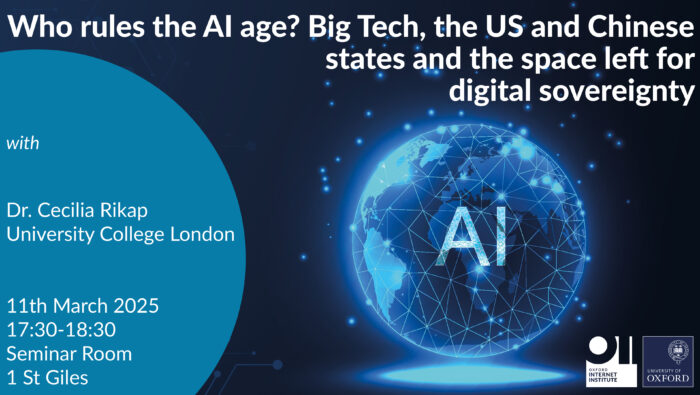About
How are artificial intelligence and the cloud shaping relationships among leading corporations and between these corporations and states? By exploring the interplay between the world’s corporate and political (super)powers, this presentation addresses the question: Who rules global capitalism, and why are digital technologies so crucial for governance and control?
In short, Big Tech is not just another instance of corporate power concentration. Digital technologies have become essential for exercising corporate power beyond the tech sector. Leaders across diverse industries have grown increasingly dependent on these technologies. Companies such as Disney, L’Oréal, McDonald’s, Nestlé, Nike, PepsiCo, Pfizer, Siemens, Toyota, Visa and Walmart rely on data and AI running on Big Tech clouds for scientific research, branding, workers’ management and value chain planning —from suppliers to demand—. The resulting, highly unequal alliances among the world’s corporate giants further reinforce their dominance. At the same time, states across the globe are becoming similarly dependent as they migrate to the cloud and adopt Big Tech AI. Among them, only the United States and China operate on a more level playing field.
Dr. Cecilia Rikap is an Associate Professor in Economics and the Head of Research at the Institute for Innovation and Public Purpose of the University College London (UCL). Until joining UCL, she was a Senior Lecturer in International Political Economy (IPE) at City, University of London and programme director of the BSc. in IPE at the same university. She is a tenure researcher of the CONICET, Argentina’s national research council, and associate researcher at COSTECH lab, Université de Technologie de Compiègne.
Rikap is the author of the award-winning book Capitalism, Power and Innovation: Intellectual Monopoly Capitalism Uncovered and co-author of the book The Digital Innovation Race in which Rikap and her co-author anticipate the politics and economics of AI that we are witnessing today.
Cecilia’s research is rooted in the international political economy of science and technology and the economics of innovation. She studies the rising concentration of intangible assets leading to the emergence of intellectual monopolies among others from digital and pharma industries. Her research highlights the unequal distribution of intellectual (including data) rents and the effects of intellectual monopolization on the knowledge commons, development and rising geopolitical tensions. Her most recent work focuses on artificial intelligence and the cloud, Big Tech companies’ dominance of these technologies, their interplay with other multinational corporations and the effects of Big Tech’s extended intellectual monopolization on digital sovereignty. Rikap has experience advising policymakers in Argentina, Brazil, France, the United Kingdom and the United States as well as dozens of civil society organizations on these matters.

